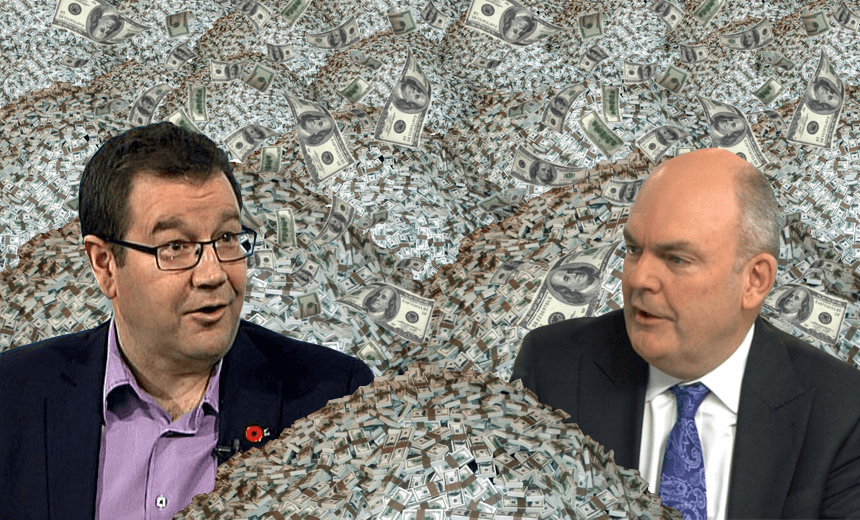Yesterday Steven Joyce claimed there was a giant hole in Labour’s books. We asked a lot of economists and accountants whether the claim was correct.
Extraordinary elections bring out extraordinary accusations. Yesterday brought the most monumental of this election so far, when National’s finance boss Steven Joyce claimed to have found a $11.7bn hole in Labour’s fiscal plan. The charge could not be more serious – any party seeking to govern that could be wrong about such a vast number is patently unfit to do so.
The nature of the 24 hour news cycle meant that it initially went out unchallenged, and was in fact repeated on that night’s debate on Three. Already millions of potential voters will have heard the claim or its reporting.
Yet the claim resists easy dismissal, thanks to the complexity of understanding budget documents for lay people, a group which includes most reporters. What that meant was that it has hung in the air since, with most – though by no means all – reports carrying both Joyce’s accusation and Labour finance spokesperson Grant Robertson’s stern denial.
Yet what is near unique about this claim is that it is not only huge – and hugely damaging, if correct – but that only one of the two can be right. It’s not about whose plan is better, which can only be proven in time. It’s about the black and white of a fiscal plan.
Given the combination of relative complexity, binary truth and election-defining importance, we decided to go to as many experts as possible for their response to one very simple question. We asked them all to reply in one word, one sentence, or longer. We list the person and their credentials, and their response. We invite the reader to draw their own conclusions from the balance of these responses.
The vital question we sent out to economists, bankers and accountants:
Steven Joyce yesterday said: “The Labour Party has an $11.7 billion hole in its fiscal plan that blows its debt out and breaks its own budget responsibility pledge”. Is he right or wrong?
The responses:
Eric Crampton, chief economist at the New Zealand Initiative
“It looks like the $11 billion dollars isn’t a hole. Instead, Labour has allocated to different spending areas funds that were left unallocated in the Pre-Election Fiscal Update. So Labour has less flexibility to allocate spending to other things in future years, or to adjust tax bands for the effects of inflation. But that is not really the same thing as a hole. It would be very nice if there were an agency of government, like the kind of Fiscal Council that the New Zealand Initiative proposed back in 2014, that could run a ruler over spending plans during elections so we wouldn’t wind up in these kinds of messes.”
Via email to The Spinoff
Brian Fallow, Former economics editor for the New Zealand Herald
“In terms of the argument, I think Robertson’s right and Joyce is wrong. It’s not really that complicated.”
On RNZ’s Checkpoint with John Campbell
Michael Reddell, former Head of Financial Markets for the Reserve Bank
“As best as I can tell, Joyce is wrong.” Reddell later expanded his answer to say: “Labour’s numbers add up – there is no hole. But their numbers do imply real (downward) pressure on lots of other areas of spending over the next few years.”
Via email to The Spinoff
Shamubeel Eaqub, independent economist, formerly of NZIER
“Joyce is wrong.”
Via email to The Spinoff
Cameron Bagrie, ANZ chief economist
“The Labour party has provided a detailed spending program over the coming four years. That’s providing some clarity over where its spending plans sit and what the fiscal numbers could be.
It’ll be a huge challenge to stick to it. There looks to be little money left for the 2019 and 2020 Budgets. Health looks taken care of and education partly so as spending lifts each year. But the rest of government does not. It will be extremely tough to meet.”
A follow up email asked for whether Bagrie would like to answer the question ‘is he right or wrong?’ He replied: “No thanks”. Newshub political journalist Lloyd Burr has also spoken to Bagrie, and has published a response:
Keith Ng, data journalist
Ultimately, there is no missing money. The money is accounted for. I suspect there’s some shenanigans around why Labour did it this way (to make the health/education/etc lines look bigger, basically), but it’s literally a question of whether you put the numbers on row 239 or row 228 in the spreadsheet.
Writing on The Spinoff
Taxpayer’s Union, a union of taxpayers
“We don’t think it’s a lie. We think on balance National are right. Our economists initially favour’d Labour’s version but revised advice.”
In a tweet
The Spinoff has requested responses from dozens of accountants and economists, both within New Zealand and overseas. Some, including Don Brash and EY, declined to comment. We will update this piece with other responses as and when they come in.

